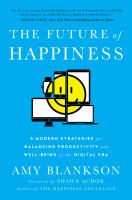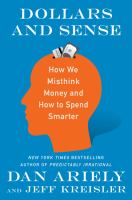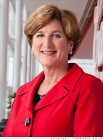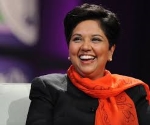Book Review: The Future of Happiness
Monday, March 19th, 2018Blankson, Amy. The future of happiness : five modern strategies for balancing productivity and well-being in the digital era. BenBella Books, 2017.
 Amy Blankson’s The Future of Happiness: 5 Modern Strategies for Balancing Productivity and Well-Being in the Digital Era presents an interesting and timely topic for readers who may wonder if there are better ways to manage their digital lives. Her author biography touts some impressive bona fides such as an Ivy League education and presidential Point of Light awards. While the topic is engaging, the book is not. Readers interested in this book may enjoy Tribe: On Homecoming and Belonging, Braving the Wilderness, or How to Be Happy at Work.
Amy Blankson’s The Future of Happiness: 5 Modern Strategies for Balancing Productivity and Well-Being in the Digital Era presents an interesting and timely topic for readers who may wonder if there are better ways to manage their digital lives. Her author biography touts some impressive bona fides such as an Ivy League education and presidential Point of Light awards. While the topic is engaging, the book is not. Readers interested in this book may enjoy Tribe: On Homecoming and Belonging, Braving the Wilderness, or How to Be Happy at Work.
The author chose to have her brother write the foreword, and his effusive praise immediately strikes the false note of over-selling. She relies on family as support for and evidence of the validity of her claims and assertions, which threads its way throughout the book and gives it an aura of an extended marketing campaign for her consulting firm and her brother’s books.
The book is divided into two parts: The Three Burning Questions and The Five Strategies. While the questions of where we are heading and what happiness might look like they are worth exploring, the question of whether we would be better off without technology seems dated and superfluous, especially given her central thesis of using technology wisely. This is a second pattern that repeats throughout; the good ideas are overshadowed by the tired and overused.
The Five Strategies section shares these weaknesses, and adds to them with a number of misstatements of fact. For example, in the Strategy #4 section, she states that the Cold War ended in 1963, that the Kennedy years were “pre-Vietnam,” and that Jimmy Carter founded Habitat for Humanity. These errors both distract from the main theme and undercut the author’s credibility. The strategies themselves aren’t particularly modern or innovative – stay grounded, know thyself, train your brain, create a habitat for happiness, and innovate consciously. Here again there are few worthwhile solutions, but many of her suggestions read more like the inevitable New Year’s resolutions article in the January issue of any number of lifestyle magazines.
Finally, the author points out another reason not to bother. She has a penchant for recommending specific apps that she likes. She even states, “I am keenly aware that by the time it [the book] is published, it will be somewhat outdated.” Interesting topic, poor execution.
 As 2017 drew to a close, Inc.’s contributing editor Jeff Haden published his list of the best books of the year, which are designed to help readers connect with ideas and perspectives that will help them make changes in their lives. Any one of these books would be an enjoyable read over Spring Break.
As 2017 drew to a close, Inc.’s contributing editor Jeff Haden published his list of the best books of the year, which are designed to help readers connect with ideas and perspectives that will help them make changes in their lives. Any one of these books would be an enjoyable read over Spring Break. Divisions seem to define the current cultural moment for many of us. Instead of seeing each other’s similarities, we focus on the ways in which we are different. This skewed focus leads to loneliness and a lack of interpersonal connection. People are seeking answers in an effort to heal the pain caused by this unhappiness.
Divisions seem to define the current cultural moment for many of us. Instead of seeing each other’s similarities, we focus on the ways in which we are different. This skewed focus leads to loneliness and a lack of interpersonal connection. People are seeking answers in an effort to heal the pain caused by this unhappiness. In Dollars and Sense: How We Misthink Money and How to Spend Smarter, Dan Ariely, bestselling author and James B. Duke Professor of Psychology and Behavioral Economics at Duke University, teams up with Jeff Kreisler, attorney, author and comedian, to examine our irrational thinking and behavior with respect to money. While written for a general audience, the book references numerous scholarly studies and provides complete notes to undergird the authors’ observations and analysis. It is divided into three sections: how we define money, how we (mis)-assess value, and how we can think more clearly about money.
In Dollars and Sense: How We Misthink Money and How to Spend Smarter, Dan Ariely, bestselling author and James B. Duke Professor of Psychology and Behavioral Economics at Duke University, teams up with Jeff Kreisler, attorney, author and comedian, to examine our irrational thinking and behavior with respect to money. While written for a general audience, the book references numerous scholarly studies and provides complete notes to undergird the authors’ observations and analysis. It is divided into three sections: how we define money, how we (mis)-assess value, and how we can think more clearly about money. “It’s been a strong year for books on economics, business and technology, according to Mohamed A. El-Erian, author and chief economic advisor at Allianz. He recommends 7 books from 2017, including:
“It’s been a strong year for books on economics, business and technology, according to Mohamed A. El-Erian, author and chief economic advisor at Allianz. He recommends 7 books from 2017, including:  Duff McDonald, author of the HBS critique, The Golden Passport. “I generally can’t stand books about management. An exception:
Duff McDonald, author of the HBS critique, The Golden Passport. “I generally can’t stand books about management. An exception:  Denise Morrison, CEO of the Campbell Soup company recommends two books:
Denise Morrison, CEO of the Campbell Soup company recommends two books:  Co-founder and President of Lyft Inc, John Zimmer reflects that “the happiest moments in life are those when we feel most connected to family, friends and the community around us.
Co-founder and President of Lyft Inc, John Zimmer reflects that “the happiest moments in life are those when we feel most connected to family, friends and the community around us.  Of all the books she read in 2017, CEO of PepsiCo Indra Nooyi felt that
Of all the books she read in 2017, CEO of PepsiCo Indra Nooyi felt that